- Home
- Deborah Blum
Love at Goon Park Page 3
Love at Goon Park Read online
Page 3
Harry remembered his parents as being determined that their children would grow beyond them. They had to fight for that—another lesson learned early. He was just three years old when his older brother Delmer was diagnosed with Pott’s disease, sometimes called tuberculosis of the spine. Lon Harlow had outguessed the local doctor on the ailment. Disturbed by the increasingly warped look of his son’s back, Lon bent an iron rod into the same odd curve. He sent the bar to a research hospital in Chicago, where doctors made the diagnosis from the distinctive bend in the metal. They recommended that the boy go to a warmer, drier climate—then the standard remedy for TB. Frightened for their son, the Israels sold their house and moved the family to New Mexico. Short on money, they camped in a small canyon outside Los Cruces. Delmer’s health did improve in the brilliantly lit New Mexico air. But the family, already poor, grew more so. They lost their remaining possessions in a season of wild spring flooding. At one point, Lon Harlow was forced to carry his children out of a rising stream when it flooded through their tent. In little more than a year, the family returned, near destitute, to start over again in Fairfield.
His parents, Harry said, “literally lived for their children. Fortunately, they did not have enough money to be really indulgent.” Not that he wouldn’t have enjoyed a little more indulgence—or extra affection. His own research would lead him to realize, many years later, how much he had felt like an afterthought and how much he had minded. “I remember my mother as a tiny, beautiful, hardworking, and efficient woman who reared four sons, and probably a husband, ably, lovingly, providently. I always thought of her as a person who loved me dearly, and I am sure she did.” With Delmer’s illness, though, he suspected “she was probably hard pressed to shower affection on others.” Harry was just a toddler when his brother fell ill. His mother was there, near the home, physically—just not quite all there emotionally for a small, shy younger brother. “I have no memory of partial maternal separation, but I may have lost some percentage time of maternal affection, and this deprivation may have resulted in consuming adolescent and adult loneliness.”
Almost five thousand settlers now occupied Fairfield. Ornate buildings, topped with towers and ramparts, housed shoemakers, grocers, barrel makers, tailors, druggists, clothing stores, furniture stores. The square was a gathering place for the farmers who now ploughed the surrounding country. Even in winter, when the farms were iced over and Fairfield’s streets were deep with snow, farmers came to town. They simply took the wheels off their wagons and replaced them with heavy, ironclad sled runners. Fairfield’s children used to play street games in which they jumped from farm bobsled to farm bobsled. They called the game “hopping bobs,” and, as one sled hopper recalled, the farmers were cheerfully tolerant of the leaping children.
Farming was the breath of the town. Harry’s father had himself listed farm properties during his real estate venture years. The local high school balanced traditional academics and agricultural education. Girls were required to take domestic art and science, courses such as “How to Cook to Please the Men.” The comparable track for boys was farm management, from crop rotation to pest control. The wood-frame homes, brick businesses, and orderly streets of Fairfield merged almost seamlessly with the outlying farms and orderly fields that surrounded it. And here was this quiet dreamer of a child, without a shimmer of interest or ability in even managing a garden. Many years later, Harry’s oldest son, Robert, would recall that the few times his father attempted yard work, he routinely uprooted prized bedding plants. “It was always, ‘Call the yard man’ at our house.” Harry had no interest in geraniums and nasturtiums as an adult, and less in tilled fields as a child. He liked to write poetry and draw pictures. He recalled once completing an essay assignment that “didn’t sound right” and deciding not to hand it in. Later he realized that he had spontaneously written the essay in blank verse. It wasn’t just that he could write verse—an impractical talent if there ever was one—he actually liked it. One of his favorite assignments came in the eighth grade. He and his fellow students were told to compose a four-line verse on the “benefits and beauties” of daily tooth brushing:Students filtered into the class expressing hate and hopelessness at the assignment. I rose to the rescue. By ten minutes of nine, I had completed fourteen verses for fourteen students—aside from the best, which I kept for myself. The teacher was pleasantly surprised at the literary level of the class and she selected five for indulgent praise. All five selected were mine but the one I selected for myself was not among them. It dawned on me that I was a better author than critic.
Mostly he was bored. “My high school academic career was not totally distinguished. I ranked thirteenth out of a class of seventy-one whose average IQ was below 100.” The top twelve, he noted, were all girls. He did outscore the entire senior class on an aptitude test created by the University of Iowa. The results were put on a big blackboard—in those times, educators didn’t consider sparing the feelings of the students. “I was about two standard deviations ahead of my nearest competitor, who was the female class valedictorian and the girl whom my grandfather hoped I would marry because she was the only daughter and granddaughter of a wealthy family,” Harry wrote in his memoir. Not in this lifetime was Harry Israel going to marry into a commitment to stay in Fairfield. He planned to be somewhere else—someone else. In the 1923 yearbook, the year of his graduation, his senior class photo shows an unsmiling boy. He has downcast eyes, a shadow of long lashes about them, smooth dark hair, lips slightly turned down at the corners. In the same yearbook, students are asked to say what they wish to be when they grow up. The dreams are mostly small ones, happy ones. One wants to be a teacher, others want to be pretty, lovable, a farmer, a musician, a farmer, a singer, a farmer. Harry Israel’s wish? At the age of seventeen, he wanted to “be famous.” He made a prediction, though, for his more probable outcome: He would simply end up insane.
The Israels, you might say, were not a routine Fairfield family. Most of the local businessmen were not building experimental washing machines in their garages. And almost all the townsfolk met and gathered and socialized at one church or another. Fairfield and the surrounding Jefferson County were a paradise of churches at the time. The Israels’ home sat in the gothic shadow of the First Methodist Church, a looming brick structure just around the corner. In the county’s first hundred years, eighty-five churches were built: twenty Methodist, nine Baptist, seven Lutheran, six Presbyterian, four Catholic; and Dutch Reformed, Christian Science, Adventist, more. One of the few failed congregations was the Episcopalian, which had been the Israels’ chosen house of worship. When the modest building burned down, though, the small congregation drifted into other houses of worship.
Lon absolutely refused to drift. Even in New Mexico he had attended the Episcopal church, wearing his faded jeans and battered hat but going every Sunday. It was Lon’s church or no church and, after a while, the family simply stayed home. The boys played cards on Sunday mornings and watched their neighbors, dressed in their best clothes, walking to church. It created something of a distance. People made friends at church, traded recipes and gossip, and planned dinners together. In a Christian town such as Fairfield, your neighbors noticed when you didn’t take your place in a pew.
“It was a small town,” says neighbor Hazel Turner Montgomery, now ninety-seven, who once lived around the corner from the Israels. She remembers as a child visiting the family, walking over to read to Delmer. She would sit in the parlor, while he was strapped to a backboard, and while away the slow afternoons. Montgomery is a small, bright-eyed, friendly woman with a fluff of silver hair. She has always enjoyed the company of others, but she’s not so sure the Israels felt the same way: “You didn’t see them walking out. Everyone knew they didn’t go to church. I don’t believe they were, well, a very sociable family.” And she’s wondered sometimes whether they were lonely. She remembers that Delmer never was quite ready for her to leave.
Lon and Mable Israel didn’t raise t
heir children to be joiners or conformers. They wanted them first to think for themselves, and fitting in took second place. If they were distant from Fairfield in some ways, lonely as children, that made them tighter as a family. They competed for honors in school, sharing achievements during meals. By family accounts, Delmer was the brightest and Harry the most competitive. He would sometimes try to catch his brother out: “Who won the battle of 1066?” he would demand, right in the middle of breakfast.
The Israels wrote and staged backyard plays. The parents insisted that all their sons study music. Robert was a genuinely talented musician, Delmer a reasonable saxophone player, Hugh a credible piano player, and Harry a dogged one. Harry played the piano, but he was never very good at it, at least compared to the artistry of his eldest brother. “My talent lay at the exact opposite end of the scale,” Harry liked to explain.
He loved art, though, and throughout his life made time to draw, creating beautiful, fantastical landscapes with ink and colored paper. Even after they entered college, Harry, Robert, and Delmer dreamed together; they invented a fantasy country, The Land of Khazoo, into which only clan members were welcome. “In the Khazooan ranks, you’ll find a few friends, well good, nothing could be more valuable—but the inner clique you’ll find to be a family affair and totally understood so far by Del, Harry and I,” wrote Robert in an explanatory letter to their father. The artist among them, Harry, was designing a shield that would bear their motto. It had three words in the crest: “Israel über alle.”
There was never a doubt that the Israel boys would go to college. Their parents saved for it, their grandparents chipped in, even their aunts contributed. “Our parents were determined,” Harry said simply. If he yearned for a life beyond Fairfield, his parents wanted it for him and his brothers as well. Harry, Delmer, who gradually eased into good health, and Hugh all went to Stanford University. Harry could hardly wait to go. He was almost there, in the different country he’d dreamed about, there where the Iowa cornfields brushed the horizon.
He was the only one though, of the California-bound Israel boys, who saw that promise and he was the only one who stayed to finish his degree at Stanford. Delmer dropped out of his law program, got married, and ran a sports equipment store in Palo Alto. At least a few people still remember him for his razor-sharp tennis game and for his shop’s beautifully re-strung racquets. Hugh studied oceanography. Unlike his brothers, though, Hugh was an Iowa boy by nature and the cold glitter of the Pacific only made him miss the gentler landscape he knew best. He returned home without earning a degree.
Their parents had moved twenty miles from Fairfield to the even smaller town of Eldon, where they were running their general store. Hugh joined them in the business and stayed there. Robert, the eldest, earned an M.D. in psychiatry at the University of Oregon in Eugene, and spent the majority of his career as chief psychiatrist at the state mental hospital in Warren, Pennsylvania. Harry—who stayed closest to Robert of all his brothers—once sent him a poem, called “The Madhouse at Midnight”:I’m in this institution
On the pretense that I’m insane
But this, as everybody knows,
Is nothing but a guise
The reason that I’m here
Is very easy to explain
The War Department Thinks
I am a pair of Russian spies
Sometime I’m going to leave this place
I haven’t picked the day
I’ll simply push the buildings down
And calmly walk away
I’ll build a little railroad
That reaches to the moon
And run a little subway
From New York to Neptune
I know where all the money
In the universe is stored
I’m the nephew of Napoleon
And cousin of the Lord.
Harry had always understood escape dreams. Hadn’t he been dreaming them himself for years? And at Stanford he found something like a railroad to the moon, a way to soar beyond the domesticated landscape of his childhood.
To a boy raised in farm country, this young university was as improbably different as a lunar landscape. Even in the 1920s, coastal California was still part wild. Stanford itself, just south of San Francisco, was a small, civilized outpost in the windblown hills. To the west was the dark blue glimmer of the ocean and to the north the still darker rise of the Sierra del Monte Diablo.
Harry liked to tell the story of how he arrived, or almost didn’t, at Stanford in 1924. He had spent a year at Reed College in Portland, Oregon—close to his Aunt Nell—when his parents decided he would be better off in California. Harry just wanted to study somewhere that made him think. He’d coasted through high school. He didn’t want to sleepwalk through college, too. “The first course to stimulate me intellectually was a freshman course in zoology that I took at Reed College. But they made me dissect a dead frog and I despised dissecting dead frogs. So I decided to find a science that was like zoology but that didn’t specialize in dead frogs.”
Delmer had already been admitted to Stanford. Their parents telegraphed Stanford ten days before the fall semester started and asked whether both brothers could attend. As Harry recalled it, Stanford was unenthusiastic. But there was a mechanism to give lastminute applicants a chance. The university gave a special examination and would admit thirty additional students, those who scored the highest on the test. Harry was among about a hundred other lastminute prospects. He looked around the exam room and gained an impression of being surrounded by giants: “One glance at my fellow applicants convinced me that one half of the hundred were football players dredged up to round out next year’s team.” He found hope in that company, though. “I decided that if I could not win against this competition, I did not deserve to go to Stanford.”
After clearing the admission hurdle, Harry enrolled as an English major. He still liked writing, and believed it was his strongest talent. His first semester thus was a terrible shock. He got a C+ in English. In a fury of disappointment, he switched his major to psychology, figuring that it would eliminate both the writing issues and the dead-frog problem. It’s worth noting that both Harry and the instructor changed their minds. The same teacher later included him in the Stanford Mosaic, a collection of works by students who were gifted writers. And Harry began to accept that perhaps he wasn’t an exceptional talent: “I rather believe that her first judgment was correct,” he said after the Mosaic appeared. Still, he never lost the habit of playing with words. Even as a psychology major, he tried taking notes in verse, although he freely admitted that describing medical symptoms in the form of poetry didn’t work that well:Apathetic Annie was complacent and serene
Though suffering from paresis,
Consumption and gangrene
But Annie did not really care
Though life was nearly gone
For Annie had a tumor in the diencephalon.
Although he would share his rhymes freely later in life—leaving doggerel verses on his grad students’ desks, mailing rhymes to friends and business associates alike—at Stanford, he kept the verse notes to himself. Apathetic Annie, Narcoleptic Nancy, and all their equally physically impaired friends were tucked neatly away. Somehow he was never quite sure that Stanford would really appreciate them. He might have been an exotic flower back in Fairfield, Iowa, and he might have been the most promising student in his high school class, but here at Leland Stanford’s memorial university, bright students surrounded him. He felt dusted with corn pollen and self-doubt.
The central Stanford campus is a beautiful, arrogant place. Frederick Law Olmstead, designer of New York City’s Central Park, laid out the university’s landscaping. Boston-based architects were chosen to give the buildings an old Italian elegance. The resulting main quadrangle is brilliant with red tile roofs, fringed palm trees and, of course, the dancing, luminous light that refracts off the nearby Pacific Ocean. It illuminates the old campus. It washes over the Memorial Church,
over its Venetian glass murals and sternly carved Victorian moral sayings: “A noble ambition is among the most helpful influences of student life and the higher this ambition is, the better.”
Harry tried to walk quietly around Stanford’s elegant passageways and shining exhortations and, oh yes, the self-styled geniuses who ran the department of psychology. As a graduate student, he worked directly under Calvin Stone, an animal behaviorist and editor of the respected Journal of Comparative and Physiological Psychology, and Walter Miles, a vision expert who would eventually design night goggles for World War II fliers. Stone and Miles, in turn, worked under Lewis Terman, the flamboyant, red-haired, ultraconfident developer of the Stanford Binet IQ test who served as the department’s chairman. Harry considered these three men—in both positive and negative ways—the fathers of his passion for the science as it existed and of his desire to change it.
He always called Walter Miles his moral mentor—although that was partly affection. Miles liked Harry, too. He went out of his way to give the young psychologist extra support. When Harry’s money started running out—and he was reluctant to demand even more sacrifices from home—Miles gave Harry a job. Miles kept a colony of rats in the garage of his Palo Alto home. Harry would hurry over to his professor’s home after a day of classes and help run the rats through experiments. He became friendly with the professor’s family; although, as he noted, not too friendly: “From time to time Dr. Miles’ disarmingly beautiful daughter dropped in and chatted on her way home from high school. Dr. Miles gently discouraged this platonic pursuit. He had higher aspirations for his daughter and so did she.”

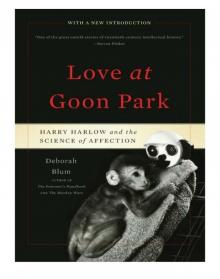 Love at Goon Park: Harry Harlow and the Science of Affection
Love at Goon Park: Harry Harlow and the Science of Affection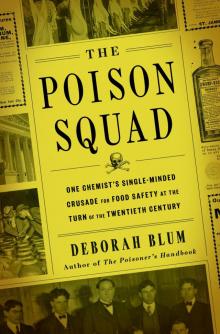 The Poison Squad
The Poison Squad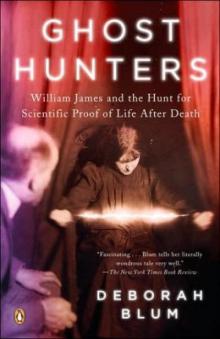 Ghost Hunters: The Victorians and the Hunt for Proof of Life After Death
Ghost Hunters: The Victorians and the Hunt for Proof of Life After Death The Poisoner's Handbook
The Poisoner's Handbook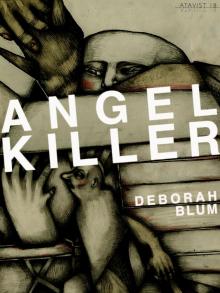 Angel Killer
Angel Killer The Best American Science and Nature Writing 2014
The Best American Science and Nature Writing 2014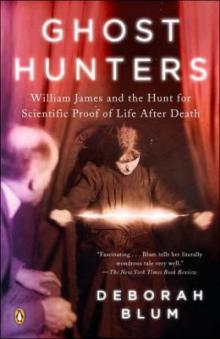 The Ghost Hunters
The Ghost Hunters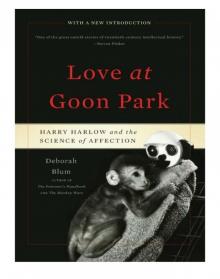 Love at Goon Park
Love at Goon Park